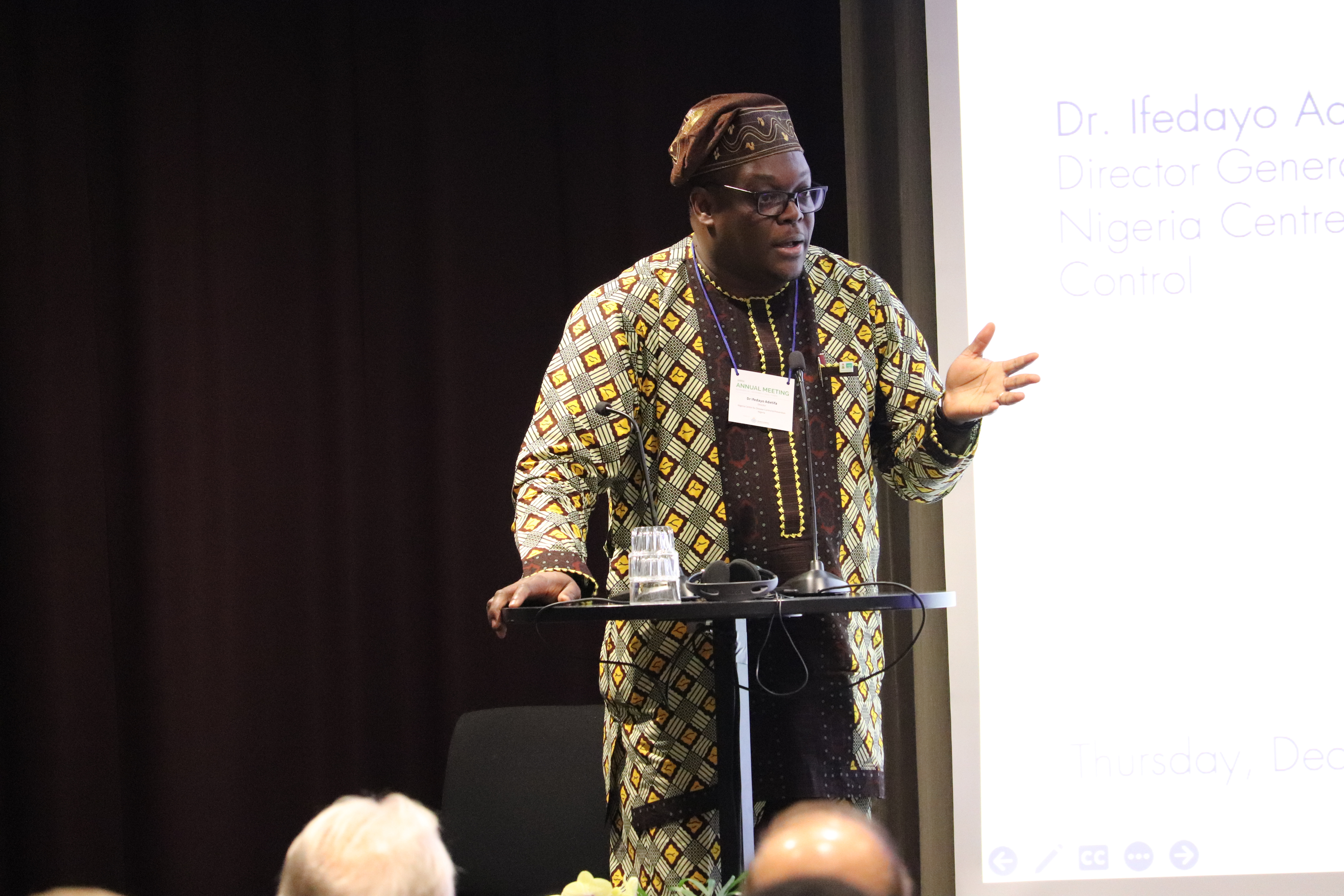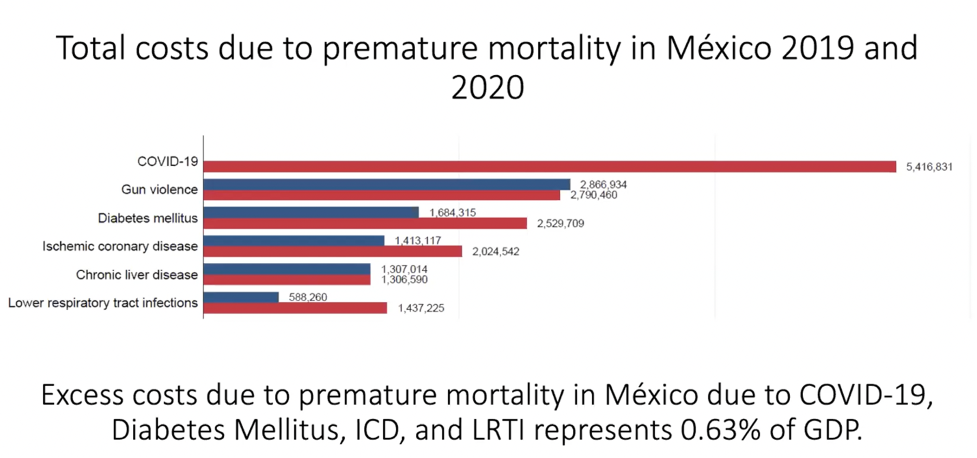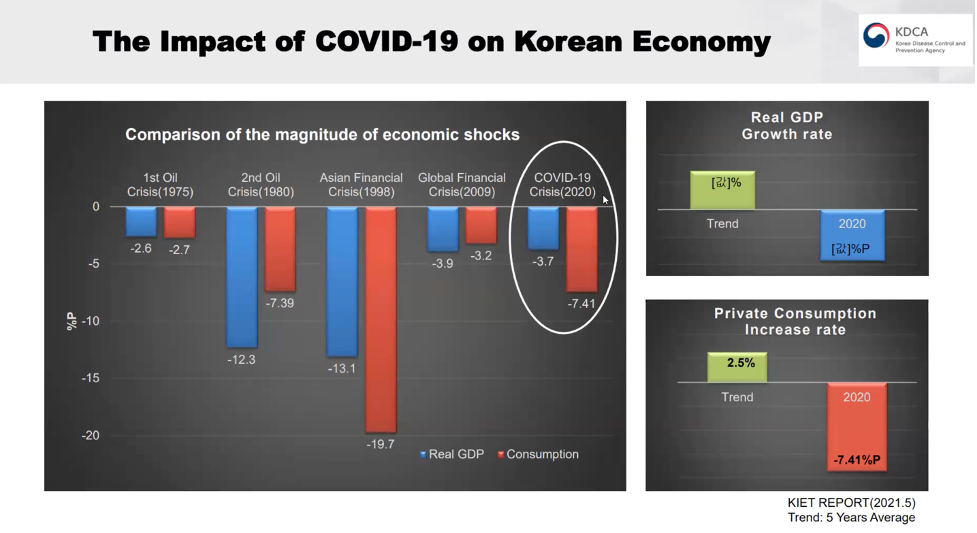Addressing the Economic Consequences of Pandemics, Conflicts, and Climate Change on Public Health
On December 1, 2022, IANPHI held a session of its 2022 Annual Meeting on the experiences of national public health institutes (NPHIs) in addressing the economic consequences of pandemics, conflicts, and climate change on public health. Moderated by Anders Nordström, Sweden’s ambassador for Global Health, the session featured leaders from the National Public Health Institute (NPHIs) of Nigeria (Nigeria Centre for Disease Control and Prevention), Mexico (National Institute of Health), South Korea (Korea Disease Control and Prevention Agency), and the United Kingdom (UK Health Security Agency).
Anders Nordström opened the conversation by discussing the consequences of pandemics and their indirect impacts. “The COVID-19 pandemic has been much more than the spread of an infectious disease,” he said. “The health impact from economic recession, children not being able to attend school, and decreased trust in public institution are still in front of us. Public health institutions across the world have a critical role not only stopping the spread of a virus but minimizing the health impact in societies at large”.
Building Back Better from the Impact of Pandemics, Conflicts, and Climate Change on Public Health in Nigeria
by Dr. Ifedayo Adetifa, Director General, Nigeria Centre for Disease Control and Prevention
For Dr. Ifedayo Adetifa, the COVID-19 pandemic was the least of Nigeria’s worries as the country was already facing issues such as other pandemics, conflicts, climate change and an inadequate healthcare system and healthcare workforce. The public health workforce was strained during the pandemic and a high percentage of affected workers resigned. According to Dr. Adetifa, it has been difficult to rehire for these roles, which poses a challenge to implementing initiatives.
Nigeria CDC has set out to consolidate responsibilities to build a stronger and unified entity that can respond more efficiently to public health emergencies. The institute has moved to a fully digital surveillance system, away from paper. Funding is generally a challenge, but the biggest constraint is the lack of strategy and of key performance indicators, which would allow funding to be properly allocated and targeted.
Dr. Adetifa stated that investments in emergency healthcare preparedness, including rapid response teams ready for any emergency across the country, should be considered. “Our world will increasingly face challenges including epidemics and pandemics, conflicts, and climate change,” he said. “The knowledge that infectious diseases will continue to emerge, conflicts affect health security, and climate change is a health issue, means that investing in health emergency preparedness is critical. Coordinated and early investments made now will cost less than reactive responses to these challenges. When they do occur, we can roll up our sleeves, do the hard work, and ensure we leverage on these challenges to build back better across all sectors. Strengthened national public health institutes leading preparedness and response efforts will contribute significantly to protecting health.”

Dr. Ifedayo Adetifa, director general of the Nigeria Centre for Disease Control and Prevention
The Economic Impact of the COVID-19 Pandemic: Estimation of the Indirect Costs of Early Mortality in 2020
by Sergio Bautista-Arredondo, National Institute of Public Health, Mexico
Sergio Bautista-Arredondo pointed out that assessing the indirect impacts of a pandemic is important because it allows NPHIs to understand the magnitude of their actions, but also gives them an understanding of how to mobilize resources. Mexico INS assessed those impacts by looking at employment rates and mortality, specifically premature deaths. In addition to COVID-19 mortality, INS noticed a spike in diabetes and coronary disease in addition to lower respiratory tract infections. There is a great burden of premature mortality due to chronic diseases.
According to Mr. Bautista-Arredondo, these deaths could be seen as a loss of productivity for the country because the affected individuals impacted the country’s gross domestic product (GDP). It is important to understand the domino effect and how moving resources and needs impact the economy.
“Officials made decisions based on the best data they had at the time,” he said. “Early, at the time, the evidence they had was that increasing the stringency of lockdown early was the best strategy. The evidence showed that economies that increased prevention measures early could have better chance to reduce long-term impacts. Now we will have more and more evidence to assess the trade-offs. One important outcome is related to mortality, not just directly from COVID.”

Economic Consequences of COVID-19 in Korea and Strengthening of the Public Health System for the preparedness to Potential Threats
by Dr. Yujin Jeong, Director for International Affairs, Korea Disease Control and Prevention Agency
According to Dr. Yujin Jeong, Korea was seen as an example of aggressive actions taken to curb the COVID-19 pandemic. The country’s economic activity declined initially due to its population’s decreased consumption and decreased GDP. However, it regained normal levels of economic activity after implementing measures that included contact tracing, the use of containment zones for infected people and vaccination for vulnerable groups, and minimizing full lockdowns. With the Delta variant, emphasis in the response was placed on social distancing measures; however, with the Omicron variant, emphasis was placed on medical countermeasures such as using the healthcare system to respond by targeting vulnerable groups while also lifting distancing/isolation measures.

Dr. Jeong explained that Korea’s success is attributed to the swift response, which had the most impact on successful control/containment of the pandemic, but also on the country’s preparedness, governance, ability to scale up its response, and leveraging partnerships in the public and private sectors. This is how not only has the country had the lowest number of deaths due to COVID-19, but is also “experiencing the shallowest recession among OECD countries,” she said.
Korea’s health budget was multiplied by seven because of the pandemic but due to purchasing vaccines and testing supplies the budget for 2023 will slightly decrease.
Resources and Responsibilities: Adapting to the Economic Consequences of Health Protection Threats – an NPHI Perspective
by Dr. Jenny Harries, Chief Executive, UK Health and Security Agency
Dr. Jenny Harries talked about the growing challenges countries are facing with because of global economics, climate change, and general global conflicts. Key threats to the UK over the last three years have included the COVID-19 pandemic, the climate crisis (heatwaves), and the financial crisis (inflation). The effects of the COVID-19 pandemic have been felt throughout society as hospitals struggled to recruit staff. Inflation is driven by global events and whole patterns of the economy are changing as society changes. Large epidemics impact health, social factors, and the economy.
Dr. Harries stated that historically, public health has been underfunded and, as a result, preparedness to respond to major threats such as the next pandemic is lacking. She emphasized that governments must continue to invest in preparedness as decreasing budgets, funding, and resources is becoming widespread. Climate change will affect the economy alongside all other threats, and it is important for all public health agencies to demonstrate value and draw a line on how healthcare funding impacts overall economic activity.
“National Public Health Institutes need to adapt quickly and be flexible to respond at pace to the economic consequences of health threats,” she said. “We need to be increasingly creative with our partnerships and build sustainable, flexible solutions with stakeholders including industry and academia. There is much we can learn from models around the world delivering high quality public health in low resource settings and from joint working in the pandemic.”